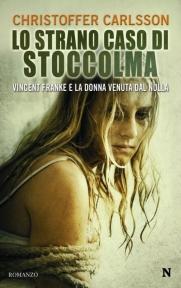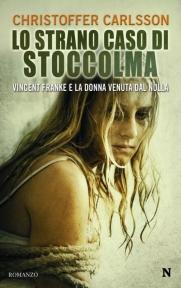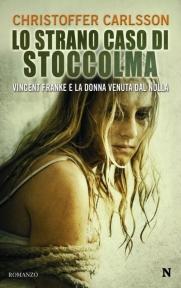Traduzione a cura di Sara Bencich
Classe 1986, vive a Stoccolma dove studia Criminologia. Con Lo strano caso di Stoccolma, formidabile romanzo d’esordio, ha ottenuto un enorme successo di pubblico e di critica. Dal sito della Newton Compton Editori

Welcome to the blog “Tutto sui libri” (Everything about Books) Christoffer and thank you for your availability. Thank you, what a great surprise! Your debut novel is a psychological thriller that delves into the mind and the human feelings. It has obtained great success in Scandinavia and is now to be published in Italytoo :“Lo strano caso di Stoccolma”(The strange case of Stockholm). How did the idea for this linear plot which captures the reader develop? Well, the book’s plot is actually quite simple. There are no tricks with time and place, there are no jumps between narrators and it’s not a transgressive thing like Fight Club or Dermaphoria. I wanted to keep the plot real straight forward, going from point A to B. The complexity and depth would come from other things – Vincent’s past, the kind of shady stuff that goes on without him knowing it, Vincent’s internal processes of fear, love, doubt, and so on. If you look at the good old American noir stories, like The Big Sleep, Red Harvest and Pop. 1280, they’re really simple in structure and narration. The depth comes from other things. And to me, my book is grounded in that tradition. But the main idea for the plot, the main character and his drug–use and so on, really came out of me wanting to write a good story and explore themes of addiction, sexuality, growing up, etc. I also wanted to reader to be left alone with one single character – everything you will see, is based on Vincent’s point of view. What Vincent can hear, feel, think, etc – that’s all you, the reader, can hear, feel, think. I wanted to have that tight, almost intimate relationship between the reader and the narrator. I wanted you to see the world like he does, filter it through his language, and thus see the world through the eyes of Vincent. However, and this was also important, I wanted you to doubt what you see. Vincent, remember, is heavily addicted to drugs – so you can’t really trust that what he sees is actually what happens. I don’t know if there is such a thing as an objective reality, an external and objective world, but IF there is (most people assume there is, anyway),then I wanted you to doubt the version you get from Vincent. This is the classic trick of “unreliable narration”, a trick that I absolutely love. Check out the intro to Iain Banks Transition for a cool use of this concept. What the trick does is, it keeps the reader alert, ready, critical. But those things, I think, can actually make the reader become even more involved in the story. Also, unreliable narrators are often a good ground for fantastic stories (you may think here of the narrator in American Psycho, the narrator in The Contortionist’s Handbook, and many, many of the old noir stories).
 Yours is a original point of view, is the narrating
voice really that of the anti-hero, a young drug addict and drug dealer. Can
you explain your choice?
Well, I guess I kind of answered that in the first question, didn’t I?
Haha. Sorry, when I start I just go on and on. But the answer I gave you, about
unreliable narration as a trick for connecting the reader to the story, is only
half the answer.
The other half of the answer is a social or a political one. Because,
besides writing a great story, I also wanted to show readers the flip side of
the welfare state, the margins of a society that thinks it includes all. I
wanted to show the people that live there, their worldview, their fears, hopes,
aspirations, and so on. Because in our time, at least in Sweden, nobody looks
at the margins. If you ask a person “what do you think about the class
society?”, many people will probably answer “What class society? We don’t have
classes anymore.” When people become that insensitive to the world around them,
so focused on their own little lifeworld, their mindfullness training and their
latte drinking and their shopping – then something is fucked up. Something is
seriously wrong – and writing about it might be a way of just showing people
the society we actually live in, and maybe suggesting a better way to move
forward.
So what I wanted to do was basically to say to the reader, you know “I
don’t care if you do something about it or not, that’s up to you – I’m going to
try to show you this, show you what I think is going on, and if you want to
look away, that’s fine, that’s ok. All I can do is try.”
But I mean, the book is a novel, a fiction story. You can’t expect too
much (if any) social change to come based on people reading a novel. And more
than anything, a good story needs to entertain – if it doesn’t entertain or
capture the reader in some way, then nothing else gets off the ground either.
So while I’ve talked a bit about social and political conditions now, it needs
to be kept in mind that what the book first and foremost is supposed to do, is
to entertain. And a young drug addict and drug dealer with a shady background
and childhood – that’s a good starting ground for creating a story that people
will care about, think about.
Yours is a original point of view, is the narrating
voice really that of the anti-hero, a young drug addict and drug dealer. Can
you explain your choice?
Well, I guess I kind of answered that in the first question, didn’t I?
Haha. Sorry, when I start I just go on and on. But the answer I gave you, about
unreliable narration as a trick for connecting the reader to the story, is only
half the answer.
The other half of the answer is a social or a political one. Because,
besides writing a great story, I also wanted to show readers the flip side of
the welfare state, the margins of a society that thinks it includes all. I
wanted to show the people that live there, their worldview, their fears, hopes,
aspirations, and so on. Because in our time, at least in Sweden, nobody looks
at the margins. If you ask a person “what do you think about the class
society?”, many people will probably answer “What class society? We don’t have
classes anymore.” When people become that insensitive to the world around them,
so focused on their own little lifeworld, their mindfullness training and their
latte drinking and their shopping – then something is fucked up. Something is
seriously wrong – and writing about it might be a way of just showing people
the society we actually live in, and maybe suggesting a better way to move
forward.
So what I wanted to do was basically to say to the reader, you know “I
don’t care if you do something about it or not, that’s up to you – I’m going to
try to show you this, show you what I think is going on, and if you want to
look away, that’s fine, that’s ok. All I can do is try.”
But I mean, the book is a novel, a fiction story. You can’t expect too
much (if any) social change to come based on people reading a novel. And more
than anything, a good story needs to entertain – if it doesn’t entertain or
capture the reader in some way, then nothing else gets off the ground either.
So while I’ve talked a bit about social and political conditions now, it needs
to be kept in mind that what the book first and foremost is supposed to do, is
to entertain. And a young drug addict and drug dealer with a shady background
and childhood – that’s a good starting ground for creating a story that people
will care about, think about.
 An obligatory question
for the blog: Who is Christoffer
Carlsson in everyday life?
In evertyday life, Christoffer Carlsson is a 24 year old guy from
Sweden, living in Stockholm. He lives in an apartment and works as a
criminologist at the Department of Criminology, Stockholm University. He is
writing this from San Francisco, where he has just attended the annual meeting
in American Society of Criminology, a four day criminology conference with
thousands of researchers coming from all over the world. He drinks too much
coffee, smokes way too much cigarettes, reads too much philosophy and
sociology, and too little great fiction. The last, great book I read was
actually The Corrections by Jonathan Franzen. I truly loved that book.
An obligatory question
for the blog: Who is Christoffer
Carlsson in everyday life?
In evertyday life, Christoffer Carlsson is a 24 year old guy from
Sweden, living in Stockholm. He lives in an apartment and works as a
criminologist at the Department of Criminology, Stockholm University. He is
writing this from San Francisco, where he has just attended the annual meeting
in American Society of Criminology, a four day criminology conference with
thousands of researchers coming from all over the world. He drinks too much
coffee, smokes way too much cigarettes, reads too much philosophy and
sociology, and too little great fiction. The last, great book I read was
actually The Corrections by Jonathan Franzen. I truly loved that book.
Have you any other literary project in progress? Can you tell us anything in advance?
Oh, yes, absolutely. Book 2 (not a sequel to book 1, but a completely different story) is almost done, I will start doing the final editing when I return from the US. This one I think will be something very special. I won’t tell you too much about it, but it’s a summer story, the way the summer feels like in a song by Bruce Springsteen. A story about love, friendship, deviant sexuality and the consequences of a crime. It’s still noir, but it’s more a kind of country noir than book 1 was. And there’s more characters, more twists and turns in the plot than in book 1. In a way it’s also my love and hate letter to the place where I grew up. I’ve just started thinking about book 3 as well. Thank you very much for your time; I send you my best regards. Do you want to add anything else? Maybe I should add one thing about the perspective I took in the book (only one, unreliable narrator etc).
The thing with most books is, there are multiple narrators. If you look at crime writers specifically, this is almost always the case - and definitely so among Swedish writers. Look at Stieg Larsson, Henning Mankell, Liza Marklund, Jens Lapidus, Håkan Nesser, Åke Edwardson - all of these writers tell their stories through multiple narrators. I wanted to do something different, but not just to be different.
Because it seems to me, that in almost any thriller or crime thriller, you have two views of the world: you have the "criminal" narrator who engages in the bad, dark practices of killing, stealing, drugging, robbing, or whatever - and then you have the "police officer" narrator (as in the case with Henning Mankell's Kurt Wallander or Sjöwall/Wahlöö's Martin Beck) or "the reporter" narrator (as in the case with Stieg Larsson's Mikael Blomkvist or Liza Marklund's Annika Bengtzon). Now, what the police officer/reporter narration often does, is to confirm the reader's feelings. What happens in the book - the killing, the robbery, or whatever - is terrible, and the reader probably feels that way too. And when Kurt Wallander or Mikael Blomkvist looks at this dark, twisted underworld of the Swedish welfare state, and says "this is terrible", the reader feels that she is not alone in feeling uneasy about what is happening. It gives the reader satisfaction, to feel that Kurt Wallander or Mikael Blomkvist is on her side in all the shit that's going on. (This line of argument, of course, assumes that the reader is always on the "good" side - something that definitely isn't always the case).
I'm not saying that this is better or worse than what I did in my book - I'm just saying that it's not something I wanted to do, because as a writer it didn't really challenge me or excite me. What I wanted to do, was to delete the reader's supposed comfort in and identification with a police officer's or a reporter's view of the world and moral stance towards what's happening. I wanted to leave the reader alone with Vincent and see what happened as they came closer, when the reader had no one to turn to but the narrator - who is a bit unpredictable and shouldn't always be trusted. That too was very important for the choice of narration and main protagonist.
Thank you, I enjoyed the interview!
Benvenuto sul Blog “Tutto sui Libri” Christoffer e grazie per la tua disponibilità.
 Grazie a te, che bella sorpresa!
Il tuo romanzo d’esordio è un thriller
psicologico che scava nella mente e nei sentimenti umani. Ha ottenuto un grande
successo in Scandinavia e adesso sta per essere pubblicato anche in Italia ( è già
in commercio nel momento della pubblicazione dell’intervista, ndr): Lo strano
caso di Stoccolma”( The strange case of Stockholm). Come nasce l‘idea di una
trama così semplice e lineare che però cattura così bene il lettore?
La trama del libro è abbastanza semplice. Non
ci sono giochi di tempo e spazio, non ci sono salti tra narratori e non è una
cosa trasgressiva come Fight Club o Dermaphoria. Volevo mantenere la trama
lineare, passando dal punto A al punto B. La complessità e la profondità
dovevano derivare da altre cose - il passato di Vincent, tutte le cose di
losche che avvengono senza che lui lo sappia, i suoi processi interni di paura,
amore, dubbio, e altro ancora. Se si guarda alle buone e vecchie storie noir
Americane, come Il Grande Sonno, Red Harvest e Pop, 1280, sono semplici nella
struttura e nella narrazione. La profondità deriva da altre cose. Il mio libro
è basato su quella tradizione.
Ma l’idea principale per la trama, il
protagonista e il suo uso di droghe e altro, sono state generate dal mio desiderio
di scrivere una buona storia ed esplorare i temi della dipendenza, sessualità,
nascita, ecc.
Inoltre volevo che il lettore si sentisse solo
assieme ad un unico protagonista - tutto quello che vedrete è basato solo sul
punto di vista di Vincent. Quello che Vincent può udire, sentire, pensare, ecc
- è tutto quello che il lettore può udire, sentire, pensare. Volevo dare quello
stretto, intimo rapporto tra il lettore e il narratore. Volevo che vedeste il
mondo come lo vede lui, filtrato attraverso il suo linguaggio, e quindi vedere
il mondo attraverso gli occhi di Vincent.
Comunque, e questo è stato anche importante,
volevo che dubitaste di quello che vedete. Vincent, ricordate, è un forte
tossicodipendente - quindi non potete veramente fidarvi che quello che vede
stia veramente succedendo. Non so se esiste una realtà oggettiva, un mondo
esterno e oggettivo, ma se c’è ( comunque molte persone credono che ci sia)
allora volevo che voi dubitaste della versione che ottenete da Vincent.
Questo è il classico trucco della “ narrazione
inattendibile” , un trucco che assolutamente amo.
Controllate l’introduzione al Transition di
Iain Banks per un uso molto bello di questo concetto.
Quello che fa questo trucco è di tenere il
lettore vigile, pronto, critico. Ma queste cose , penso, possono far diventare
il lettore anche più coinvolto nella storia. Inoltre i narratori inattendibili
sono spesso una buona base per fantastiche storie ( potete pensare ai narratori
di American Psycho, il narratore de “ Il manuale del contorsionista”, e molte ,
molte delle vecchie storie noir.
Grazie a te, che bella sorpresa!
Il tuo romanzo d’esordio è un thriller
psicologico che scava nella mente e nei sentimenti umani. Ha ottenuto un grande
successo in Scandinavia e adesso sta per essere pubblicato anche in Italia ( è già
in commercio nel momento della pubblicazione dell’intervista, ndr): Lo strano
caso di Stoccolma”( The strange case of Stockholm). Come nasce l‘idea di una
trama così semplice e lineare che però cattura così bene il lettore?
La trama del libro è abbastanza semplice. Non
ci sono giochi di tempo e spazio, non ci sono salti tra narratori e non è una
cosa trasgressiva come Fight Club o Dermaphoria. Volevo mantenere la trama
lineare, passando dal punto A al punto B. La complessità e la profondità
dovevano derivare da altre cose - il passato di Vincent, tutte le cose di
losche che avvengono senza che lui lo sappia, i suoi processi interni di paura,
amore, dubbio, e altro ancora. Se si guarda alle buone e vecchie storie noir
Americane, come Il Grande Sonno, Red Harvest e Pop, 1280, sono semplici nella
struttura e nella narrazione. La profondità deriva da altre cose. Il mio libro
è basato su quella tradizione.
Ma l’idea principale per la trama, il
protagonista e il suo uso di droghe e altro, sono state generate dal mio desiderio
di scrivere una buona storia ed esplorare i temi della dipendenza, sessualità,
nascita, ecc.
Inoltre volevo che il lettore si sentisse solo
assieme ad un unico protagonista - tutto quello che vedrete è basato solo sul
punto di vista di Vincent. Quello che Vincent può udire, sentire, pensare, ecc
- è tutto quello che il lettore può udire, sentire, pensare. Volevo dare quello
stretto, intimo rapporto tra il lettore e il narratore. Volevo che vedeste il
mondo come lo vede lui, filtrato attraverso il suo linguaggio, e quindi vedere
il mondo attraverso gli occhi di Vincent.
Comunque, e questo è stato anche importante,
volevo che dubitaste di quello che vedete. Vincent, ricordate, è un forte
tossicodipendente - quindi non potete veramente fidarvi che quello che vede
stia veramente succedendo. Non so se esiste una realtà oggettiva, un mondo
esterno e oggettivo, ma se c’è ( comunque molte persone credono che ci sia)
allora volevo che voi dubitaste della versione che ottenete da Vincent.
Questo è il classico trucco della “ narrazione
inattendibile” , un trucco che assolutamente amo.
Controllate l’introduzione al Transition di
Iain Banks per un uso molto bello di questo concetto.
Quello che fa questo trucco è di tenere il
lettore vigile, pronto, critico. Ma queste cose , penso, possono far diventare
il lettore anche più coinvolto nella storia. Inoltre i narratori inattendibili
sono spesso una buona base per fantastiche storie ( potete pensare ai narratori
di American Psycho, il narratore de “ Il manuale del contorsionista”, e molte ,
molte delle vecchie storie noir.
 Il tuo è un originale punto di vista, la
voce narrante è proprio quella dell’anti-eroe, un giovane tossicodipendente e
spacciatore. Può spiegarci la sua scelta?
Bè, credo di aver già risposto nella prima
domanda, non è vero? Ha,ha, scusami ma quando inizio non riesco a fermarmi. Ma
la risposta che ti ho dato, sulla narrazione inattendibile come trucco per
collegare il lettore alla storia, è solo metà della risposta.
L’altra metà è una risposta politica o sociale.
Poiché, oltre a scrivere una buona storia, volevo mostrare ai lettori l’altra
faccia della medaglia dello stato sociale, i margini della società che credo
includono tutto. Volevo mostrare alle persone che vi abitano, la loro visione
del mondo, le loro paure, speranze, aspirazioni, e altro. Perché al giorno
d’oggi, almeno in Svezia, nessuno guarda ai margini. Se chiedete a una persona
“ cosa pensi delle classi sociali?” molte persone probabilmente ti
risponderanno “ Quali classi sociali? Non abbiamo più classi sociali”. Quando
le persone diventano così insensibili al mondo circostante, così concentrati
nel loro piccolo mondo, nella loro formazione mentale, nelle loro pause caffè e
nello shopping, allora qualcosa è fottuto!
Qualcosa è veramente sbagliato - e lo scrivere
di ciò può essere un modo per mostrare alle persone la società in cui realmente
vivono magari suggerire un modo migliore per andare avanti. Perciò quello che
volevo fare è dire al lettore “ Non mi interessa se fai qualcosa a tal riguardo,
è una tua scelta. Io voglio provare a mostrarvi ciò, mostrare quello che credo
stia accadendo, e se volete guardare altrove, va bene, è ok. Tutto quello che
posso fare è provare”.
Ma voglio dire, il libro è un romanzo, una
storia inventata. Non puoi aspettarti molti ( se non nessun) cambiamenti
sociali basati sulla lettura di un romanzo. E più di qualsiasi altra cosa una
storia serve a intrattenere - se non intrattiene o non cattura il lettore in
qualche modo, allora nient’altro può succedere. Quindi, mentre ora ho parlato
un po’ delle condizioni politiche e sociali, bisogna tenere a mente che quello
che il libro per prima cosa deve fare cioè di intrattenere.
E un giovane tossico dipendente e spacciatore
con un’ infanzia e un passato losco - questo è un buon punto di partenza per
creare una storia a cui le persone si affezionano, a cui penseranno.
Una domanda obbligatoria per il blog:
Chi è Christoffer Carlsson nella vita di ogni giorno?
Nella vita di tutti i giorni Christoffer Carlsson
è un ragazzo di 24 anni svedese, che abita a Stoccolma. Vive in un appartamento
e lavora come criminologo nel Dipartimento di Criminologia presso l’Università
di Stoccolma. Adesso scrive da San Francisco, dove sta partecipando all’annuale
raduno dell’Associazione Americana di Criminologia, 4 giorni di conferenze di
criminologia con migliaia di ricercatori provenienti dal tutto i mondo. Beve
troppo caffè, fuma troppe sigarette, legge troppa filosofia e sociologia e
troppo poca buona fiction.
L’ultimo buon libro che ho letto è stato Le
Correzioni di Jhonatan Franzen. Ho amato veramente quel libro.
Il tuo è un originale punto di vista, la
voce narrante è proprio quella dell’anti-eroe, un giovane tossicodipendente e
spacciatore. Può spiegarci la sua scelta?
Bè, credo di aver già risposto nella prima
domanda, non è vero? Ha,ha, scusami ma quando inizio non riesco a fermarmi. Ma
la risposta che ti ho dato, sulla narrazione inattendibile come trucco per
collegare il lettore alla storia, è solo metà della risposta.
L’altra metà è una risposta politica o sociale.
Poiché, oltre a scrivere una buona storia, volevo mostrare ai lettori l’altra
faccia della medaglia dello stato sociale, i margini della società che credo
includono tutto. Volevo mostrare alle persone che vi abitano, la loro visione
del mondo, le loro paure, speranze, aspirazioni, e altro. Perché al giorno
d’oggi, almeno in Svezia, nessuno guarda ai margini. Se chiedete a una persona
“ cosa pensi delle classi sociali?” molte persone probabilmente ti
risponderanno “ Quali classi sociali? Non abbiamo più classi sociali”. Quando
le persone diventano così insensibili al mondo circostante, così concentrati
nel loro piccolo mondo, nella loro formazione mentale, nelle loro pause caffè e
nello shopping, allora qualcosa è fottuto!
Qualcosa è veramente sbagliato - e lo scrivere
di ciò può essere un modo per mostrare alle persone la società in cui realmente
vivono magari suggerire un modo migliore per andare avanti. Perciò quello che
volevo fare è dire al lettore “ Non mi interessa se fai qualcosa a tal riguardo,
è una tua scelta. Io voglio provare a mostrarvi ciò, mostrare quello che credo
stia accadendo, e se volete guardare altrove, va bene, è ok. Tutto quello che
posso fare è provare”.
Ma voglio dire, il libro è un romanzo, una
storia inventata. Non puoi aspettarti molti ( se non nessun) cambiamenti
sociali basati sulla lettura di un romanzo. E più di qualsiasi altra cosa una
storia serve a intrattenere - se non intrattiene o non cattura il lettore in
qualche modo, allora nient’altro può succedere. Quindi, mentre ora ho parlato
un po’ delle condizioni politiche e sociali, bisogna tenere a mente che quello
che il libro per prima cosa deve fare cioè di intrattenere.
E un giovane tossico dipendente e spacciatore
con un’ infanzia e un passato losco - questo è un buon punto di partenza per
creare una storia a cui le persone si affezionano, a cui penseranno.
Una domanda obbligatoria per il blog:
Chi è Christoffer Carlsson nella vita di ogni giorno?
Nella vita di tutti i giorni Christoffer Carlsson
è un ragazzo di 24 anni svedese, che abita a Stoccolma. Vive in un appartamento
e lavora come criminologo nel Dipartimento di Criminologia presso l’Università
di Stoccolma. Adesso scrive da San Francisco, dove sta partecipando all’annuale
raduno dell’Associazione Americana di Criminologia, 4 giorni di conferenze di
criminologia con migliaia di ricercatori provenienti dal tutto i mondo. Beve
troppo caffè, fuma troppe sigarette, legge troppa filosofia e sociologia e
troppo poca buona fiction.
L’ultimo buon libro che ho letto è stato Le
Correzioni di Jhonatan Franzen. Ho amato veramente quel libro.
 Ha altri progetti letterari in lavoro?
Ci può dare qualche anticipazione?
Oh sì, assolutamente. Il Libro 2 ( non un
seguito del Libro 1 ma una storia completamente diversa) è praticamente finito,
farò la revisione finale al mio rientro dagli USA.
Questo, penso, sarà qualcosa di molto speciale.
Non vi dirò molto a riguardo, ma è una storia estiva, il modo in cui l’estate
si sente in una canzone di Bruce Springsteen. Una storia d’amore, amicizia,
sessualità deviata e le conseguenze di un crimine.
È un noir , ma un noir più provinciale rispetto
al Libro 1. E ci sono più personaggi, più intrighi e più colpi di scena nella
trama. In un certo senso è anche la mia lettera di odio e amore verso il luogo
in cui sono cresciuto.
Ho appena cominciato a pensare anche al Libro
3.
Ti ringrazio per il tuo tempo; ti mando
i miei più sentiti saluti. Vuoi aggiungere qualcosa?
Forse
dovrei aggiungere qualcosa sulla prospettiva che ho preso nel libro (solo una,
il narratore inaffidabile ecc..)
Ha altri progetti letterari in lavoro?
Ci può dare qualche anticipazione?
Oh sì, assolutamente. Il Libro 2 ( non un
seguito del Libro 1 ma una storia completamente diversa) è praticamente finito,
farò la revisione finale al mio rientro dagli USA.
Questo, penso, sarà qualcosa di molto speciale.
Non vi dirò molto a riguardo, ma è una storia estiva, il modo in cui l’estate
si sente in una canzone di Bruce Springsteen. Una storia d’amore, amicizia,
sessualità deviata e le conseguenze di un crimine.
È un noir , ma un noir più provinciale rispetto
al Libro 1. E ci sono più personaggi, più intrighi e più colpi di scena nella
trama. In un certo senso è anche la mia lettera di odio e amore verso il luogo
in cui sono cresciuto.
Ho appena cominciato a pensare anche al Libro
3.
Ti ringrazio per il tuo tempo; ti mando
i miei più sentiti saluti. Vuoi aggiungere qualcosa?
Forse
dovrei aggiungere qualcosa sulla prospettiva che ho preso nel libro (solo una,
il narratore inaffidabile ecc..)Il fatto è che nella maggior parte dei libri ci sono molteplici narratori. Se guardi gli scrittori gialli specificatamente, lo sono sempre e sicuramente lo sono gli scrittori Svedesi.
Guarda a Stieg Larsson, Henning Mankell, Liza Marklund, Jens Lapidus, Håkan Nesser, Åke Edwardson- tutti questi scrittori raccontano la loro storia attraverso molteplici narratori. Volevo fare qualcosa di diverso, ma non solo per essere diverso.
Perchè, mi sembra, che in quasi tutti i thriller o gialli, si hanno due punti di vista del mondo: hai il narratore "criminale" che prende parte a quelle oscure e malvage pratiche di uccidere, rubare, drogarsi, e quant'altro- e poi hai il narratore "poliziotto" ( come nel caso di Henning Mankell's Kurt Wallander or Sjöwall/Wahlöö's Martin Beck ) o il narratore "reporter" ( come nel caso di Stieg Larsson's Mikael Blomkvist or Liza Marklund's Annika Bengtzon). Ora, quello che il narratore reporter/poliziotto fa, è di confermare i sentimenti del lettore. quello che succede nel libro - l'omicidio, il furto e altro- è terribile, e il lettore probabilmente si sente allo stesso modo. E quando Kurt Wallander o Mikael Blomkvist guardano a questa oscuro e contorto bassofondo della società Svedese, e dicono "tutto ciò è terribile", il lettore sente che non è da solo nello sentirsi preoccupato di quello che sta succedendo. ( Su questa linea di argomentazione, ovviamente, si presuppone che il lettore sia sempre dalla parte del "bene" - cosa che sicuramente non è sempre vera). Non dico che quello che ho fatto nel mio libro sia meglio o peggio - sto dicendo che non era quello che volevo fare, perchè come scrittore tutto ciò non mi stimolava , non mi eccitava. Quello che volevo fare, era eliminare lo stato di agio del lettore nell'identificarsi con il punto di vista del poliziotto o del reporter e con la posizione moralista verso ciò che sta accadendo. Volevo lasciare il lettore da solo con Vincent e vedere cosa succedeva quando si avvicinavano, quando il lettore non aveva altri a cui rivolgersi se non al narratore - che è un po’ imprevedibile,e di cui non bisognerebbe sempre fidarsi. Anche questo era molto importante per la scelta della narrazione e del protagonista principale.
Grazie a te, ho apprezzato l’intervista!
Il sito dell'autore: clikka qui!
Per leggere la recensione e partecipare al giveaway del libro "Lo strano caso di Stoccolma" clikka QUI!






